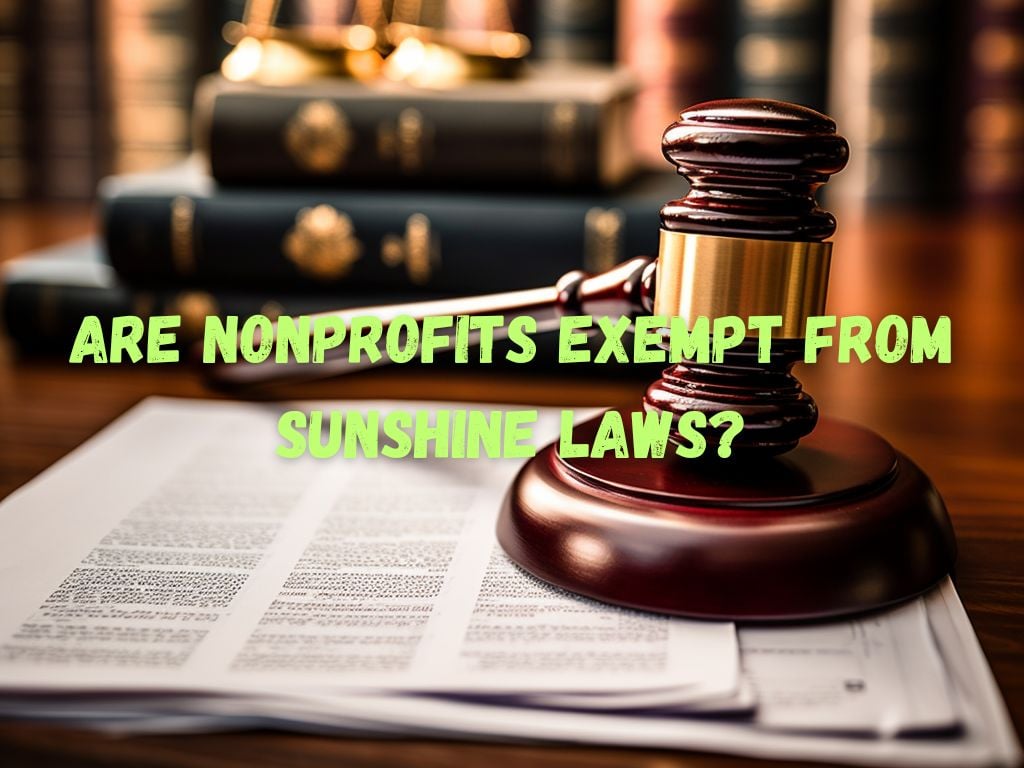When it comes to the transparency and accountability of nonprofit organizations, there is often confusion regarding their obligations under sunshine laws.
Sunshine laws, also known as open records or freedom of information laws, are designed to ensure that government activities are accessible to the public.
But what about other use cases? For example, are nonprofits exempt from sunshine laws?
In this article, we will explore the exemptions of nonprofit organizations from sunshine laws and the impact of these exemptions on transparency.
We will also address some frequently asked questions and shed light on the importance of transparency in the nonprofit sector.
What Are Nonprofits?
Nonprofit organizations, also known as not-for-profit organizations, are entities that operate to achieve a specific mission or purpose, rather than generating profits for shareholders.
These organizations exist to provide public benefits, serve a specific cause or community, and are typically exempt from paying income taxes.
Nonprofits operate in various fields such as healthcare, education, social services, arts, and more. Examples of nonprofits include charities, foundations, advocacy groups, and educational institutions.

What Are Sunshine Laws?
Sunshine laws are legislation enacted at the federal, state, and local levels with the aim of promoting openness and transparency in government operations.
These laws grant individuals the right to access government records, attend public meetings, and learn about the decision-making processes of public officials.
Sunshine laws play a crucial role in holding those in power accountable, fostering trust in government, and ensuring that citizens have the information they need to participate in civic life.
Are Nonprofits Exempt from Sunshine Laws?
While sunshine laws primarily apply to government entities, nonprofit organizations may be subject to specific exemptions.
The exemptions can vary from one jurisdiction to another, so it is essential for nonprofits to be aware of the laws that apply to them.
However, it is crucial to note that nonprofits are generally subject to some form of transparency requirements to maintain public trust, even if they are partially exempt from sunshine laws.
One common exemption for nonprofits is related to their proprietary or commercially sensitive information.
This exemption is in place to protect trade secrets and confidential business information that could harm the organization’s competitive position if disclosed publicly.
Nonprofits engaged in income-generating activities or contract relationships with private entities may rely on this exemption to withhold certain records or information from public disclosure.
Another exemption relates to personal privacy. Nonprofits, like any other organization, must protect the personal information and privacy of individuals involved in their operations.
This includes sensitive data such as Social Security numbers, medical records, and other personally identifiable information.
Nonprofits may redact or withhold personal information from public records to comply with privacy laws and protect individuals’ rights.
Nonprofits may also enjoy exemptions concerning donor information. While nonprofit organizations are generally required to disclose information about their donors, some jurisdictions provide limited exemptions to protect the anonymity of donors in certain circumstances.
This exemption aims to safeguard the privacy of individuals who wish to support a cause without public scrutiny or potential backlash.
The Impact of Nonprofit Exemptions on Transparency
Although nonprofits may be partially exempt from sunshine laws, it is crucial to understand the impact of these exemptions on transparency. Nonprofits exist to serve the public interest and as such, are expected to demonstrate transparency and accountability to maintain public trust.
Exemptions from sunshine laws do not mean that nonprofits can operate in secrecy or without any form of oversight.
Nonprofits still have an ethical and legal obligation to disclose information that is in the public interest and relevant to their mission.
Transparent practices, including regular financial reporting, public disclosure of programs and outcomes, and open governance structures, are critical to demonstrating accountability and maintaining public trust.
It is important to note that exemptions in sunshine laws are intended to strike a balance between transparency and protecting the interests of nonprofits.
However, in recent years, there have been ongoing discussions about the need to reassess these exemptions and strengthen transparency requirements for nonprofits.
Advocates argue that increased transparency can help prevent fraud, mismanagement, and other unethical practices within the nonprofit sector, leading to more effective and accountable organizations.

Frequently Asked Questions
Q: What are the consequences of violating sunshine laws for nonprofits?
A: Nonprofits that violate sunshine laws may face legal repercussions, including fines, penalties, and damage to their reputation. It is essential for nonprofits to familiarize themselves with the specific requirements of their jurisdiction to ensure compliance and avoid potential legal consequences.
Q: Are nonprofits required to disclose information about their donors?
A: Generally, nonprofits are required to disclose information about their donors, including the names of individuals or organizations that contribute significant amounts. However, some jurisdictions provide limited exemptions to protect the privacy of donors in certain circumstances.
Q: Can nonprofits redact personal information from public records?
A: Nonprofits must protect the personal information and privacy of individuals involved in their operations. They have the authority to redact or withhold personal information from public records to comply with privacy laws and protect individuals’ rights.
Q: Are nonprofits subject to financial reporting requirements?
A: Yes, nonprofits are generally required to follow specific financial reporting requirements, including filing annual tax returns (e.g., Form 990 in the United States). These reports provide important financial and operational information to the public and ensure accountability.
Conclusion
Transparency is a crucial aspect of maintaining public trust in the nonprofit sector. While nonprofits may enjoy exemptions from sunshine laws in certain areas, it is essential for them to understand their obligations and embrace transparency voluntarily.
Nonprofits play a vital role in society, and being open, accountable, and transparent is key to fulfilling their mission and ensuring public confidence.
As calls for increased transparency within the nonprofit sector continue, it is important for organizations to prioritize transparency in their operations and embrace the spirit of sunshine laws to build trust with stakeholders and the public.


 Tags:
Tags:










